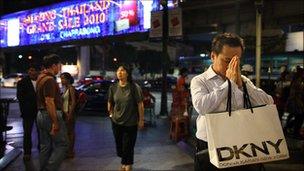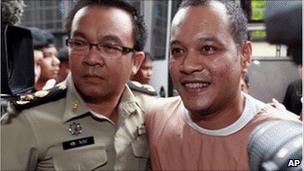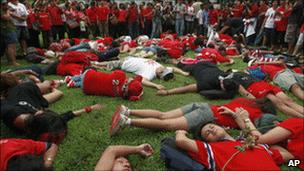Divided Thailand seeks elusive 'normalcy'
- Published

At first glance, a sense of "normalcy" seems to have returned to Bangkok
The traffic jams are back, the shopping malls are busy and banners extol the famous smile of Thailand.
Government business is being conducted - parliament is debating a record budget that rewards crucial coalition allies and the military, and aims to help the poor.
But three months after anti-government protests ended in a military crackdown with 91 people dead, some critics talk openly of a "great bamboozling" going on.
At first glance, the "normalcy" touted by Prime Minister Abhisit Vejjajiva appears to have arrived.
A series of committees have been set up, led by venerable names in Thai society, to pursue truth, justice and reconciliation. Seventeen protest leaders, known as red-shirts, have been charged with terrorism.
"By following the process of law, I think we have quelled the violent actions the red-shirts were perpetuating, and censorship has helped to calm down the incitements to violence," said Kraisak Choonhavan, chairman of the Democrat party, the main coalition government party.
Security high
"Reconciliation is being slowly worked out," he told the BBC - even though the red-shirts are either loyalists of former Prime Minister Thaksin Shinawatra, or "radical, fabian, republican and left-wing academics", who are "very difficult to reach".
He wants to see the legal cases moved along more quickly in the interests of justice, and says the government has no plan to call an election until it must, by December 2011.

Nattawut Saikua, once a leading red-shirt rally speaker, now charged with terrorism
The government insists it is tackling social reforms, and continues to claim a conspiracy is afoot to abolish the monarchy, although teams of hundreds of detectives have failed to provide specifics.
The Centre for the Resolution of Emergency Situations, which managed the government's response to the protests, still exists, and insists security must remain tight.
A state of emergency still holds sway over Bangkok and six other provinces - allowing for arrest without charge, censorship and other controls.
Despite this, at least two explosions have occurred in the centre of Bangkok, killing one person and injuring others.
The 'bamboozle'
But the government's claim to be recreating "normalcy" and bringing the country together is just part of what political scientist Thitinan Pongsudhirak calls "the great bamboozling".
"Things have quietened down on the surface but the issues are still very raw, they are lurking underneath," he said.
The reconciliation committees are "time-buying instruments" which "are not really about compromise, they are about [the government] prevailing," he said.

Red-shirt supporters have defied emergency laws for symbolic acts, here in Bangkok's Lumpini Park
A satirical website, NotTheNation, external, captured the mood of the moment with a fictional report about the grand sales going on at the Central department stores, describing them as the "Let's Pretend Nothing Ever Happened" sale, promising "fun and a false sense of national unity for the whole family".
More seriously, Dr Thitinan believes the government is pursuing repression not reconciliation.
"With the huge budget to lubricate the electoral arena in one hand and the draconian emergency decree to persecute dissidents and opponents in the other, the government is poised to exercise other options to hold down its version of Thailand.
"The army and its Internal Security Operations Command have fanned out in pro-red areas for pacification and suppression efforts like they used to conduct against communism during the Cold War, augmented by systematic campaigns that deploy royalist symbols," says Dr Thitinan, of Chulalongkorn University.
Divided loyalties
The government's director of provincial administration, Mongkol Surasajja, confirmed to the BBC that his staff have been mounting special seminars about the need to show loyalty to the monarchy and the nation.
The political education sessions are being held in every province, he said; everyone who attends, who he said were all volunteers, declare new oaths of loyalty to the monarchy.
But all this may not be enough to put Thailand back together again.
The Governor of Bangkok, Sukhumbhand Paripatra, says Thailand is now a deeply divided country.
"The crisis that began this time in March and lasted until now is sui generis [unique]. It was not like the crisis in 1992 or 1976 or 1973. The divisions are far deeper. The earlier crises were purely political. The divisions now go right down to every level of society.
"This time communities are divided, families are divided, workplaces are divided, companies are divided, even government offices are divided. This is a deeply divided country, a deeply divided city.
"For those who do not take political sides I think what they have undergone is a very traumatic experience. All these things need healing. All of these things need curing and rehabilitation," he told the BBC.
Mr Paripatra, a senior member of the Democrat party, insists the government must understand the necessity to include Mr Shinawatra in any negotiations to resolve the conflict.
"The hardest part is to convey the message that this is a government of the nation, not just a government of only a group of people.
"There are so many issues which are considered controversial by the government, that were raised by the red-shirts, and they have to be addressed, not just ignored or swept under the carpet."
- Published20 May 2010
- Published19 May 2010